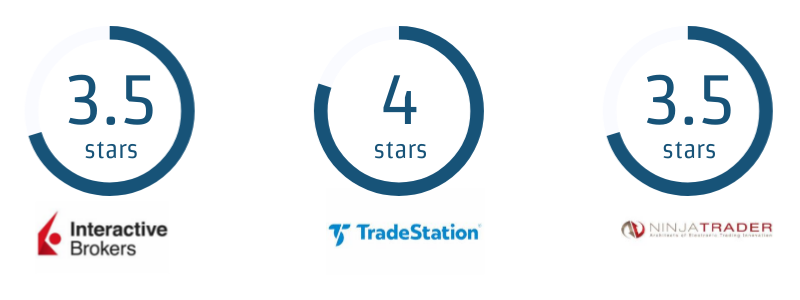
Managed futures are able to produce returns in both the bull and bear markets, rather than traditional asset classes. They can also be highly diversified, allowing investors the ability to take positions in a wide range asset classes such as equities, fixed income, and commodities. The strategy uses trend-following signals and active trading to generate returns. This strategy allows investors to position on both commodities and stocks globally, as well as allowing for high levels of diversification.
Managed futures can be a popular alternative investment strategy. Most programs are quantitatively driven. This means that they identify trends and then trade based on them. Although these strategies can be volatile, they are an effective way to hedge portfolio risk. These strategies are best when the market is experiencing a prolonged equity selloff or a regime change. However, it's important to remember that past performance is no guarantee of future results.

Many managed futures products can be purchased in liquid structures. This allows for quick liquidation. These strategies can also be used to diversify because they are not often associated with traditional assets. A 5-15% allocation to managed futures in a portfolio can offer a good mix of diversification and volatility. Also, a managed-futures strategy might not be a good option to hedge against sudden market movements. Investors who are able identify and capitalize on price trends in the future may be more successful than those who aren't.
A managed futures plan is often a combination of long and short strategies. This strategy uses both long and brief futures contracts for positions on a variety asset classes. It is usually more volatile that a long-only plan, so most managers set volatility levels between 0-10%. This volatility is typically closer to equity volatility that core bond volatility. Additionally, managed futures strategies perform better during market selloffs that last for a long time or when there is a change in the market.
Managed futures accounts are managed by a commodity pool operator, a company regulated by the CFTC. The CFTC requires that the operator pass a Series 3 exam. The CFTC also requires the operator to register with NFA. The NFA regulates large companies. It has the power to make investments decisions for its clients.

Individual and institutional investors alike can benefit from managed futures strategies. These funds are usually offered by major brokerage firms. The fees charged for managed funds can be high. They charge a 20% per annum performance fee. This can make investing in managed futures funds unaffordable. However, they have become increasingly popular over the past few years. They also show strong performance in both bear and bull markets. They are also often offered in transparent structures which make them an attractive choice for investors looking for low-cost ways to hedge risk.
FAQ
Are bonds tradable?
The answer is yes, they are! Bonds are traded on exchanges just as shares are. They have been doing so for many decades.
The difference between them is the fact that you cannot buy a bonds directly from the issuer. You must go through a broker who buys them on your behalf.
Because there are fewer intermediaries involved, it makes buying bonds much simpler. You will need to find someone to purchase your bond if you wish to sell it.
There are different types of bonds available. While some bonds pay interest at regular intervals, others do not.
Some pay interest quarterly while others pay an annual rate. These differences make it easy compare bonds.
Bonds can be very useful for investing your money. If you put PS10,000 into a savings account, you'd earn 0.75% per year. You would earn 12.5% per annum if you put the same amount into a 10-year government bond.
You could get a higher return if you invested all these investments in a portfolio.
Why are marketable securities important?
An investment company's primary purpose is to earn income from investments. This is done by investing in different types of financial instruments, such as bonds and stocks. These securities are attractive because they have certain attributes that make them appealing to investors. They may be considered to be safe because they are backed by the full faith and credit of the issuer, they pay dividends, interest, or both, they offer growth potential, and/or they carry tax advantages.
What security is considered "marketable" is the most important characteristic. This refers to how easily the security can be traded on the stock exchange. If securities are not marketable, they cannot be purchased or sold without a broker.
Marketable securities include corporate bonds and government bonds, preferred stocks and common stocks, convertible debts, unit trusts and real estate investment trusts. Money market funds and exchange-traded money are also available.
These securities are often invested by investment companies because they have higher profits than investing in more risky securities, such as shares (equities).
How can I invest in stock market?
Brokers allow you to buy or sell securities. A broker buys or sells securities for you. When you trade securities, brokerage commissions are paid.
Banks typically charge higher fees for brokers. Banks will often offer higher rates, as they don’t make money selling securities.
An account must be opened with a broker or bank if you plan to invest in stock.
If you are using a broker to help you buy and sell securities, he will give you an estimate of how much it would cost. Based on the amount of each transaction, he will calculate this fee.
You should ask your broker about:
-
To trade, you must first deposit a minimum amount
-
whether there are additional charges if you close your position before expiration
-
What happens if your loss exceeds $5,000 in one day?
-
How long can you hold positions while not paying taxes?
-
How much you can borrow against your portfolio
-
Whether you are able to transfer funds between accounts
-
How long it takes for transactions to be settled
-
the best way to buy or sell securities
-
How to avoid fraud
-
how to get help if you need it
-
If you are able to stop trading at any moment
-
How to report trades to government
-
whether you need to file reports with the SEC
-
Do you have to keep records about your transactions?
-
How do you register with the SEC?
-
What is registration?
-
How does it affect me?
-
Who must be registered
-
When do I need to register?
How Do People Lose Money in the Stock Market?
The stock exchange is not a place you can make money selling high and buying cheap. You can lose money buying high and selling low.
Stock market is a place for those who are willing and able to take risks. They want to buy stocks at prices they think are too low and sell them when they think they are too high.
They believe they will gain from the market's volatility. They might lose everything if they don’t pay attention.
What is security in the stock market?
Security is an asset that generates income. Most security comes in the form of shares in companies.
One company might issue different types, such as bonds, preferred shares, and common stocks.
The earnings per share (EPS), and the dividends paid by the company determine the value of a share.
A share is a piece of the business that you own and you have a claim to future profits. If the company pays you a dividend, it will pay you money.
You can sell your shares at any time.
Statistics
- Individuals with very limited financial experience are either terrified by horror stories of average investors losing 50% of their portfolio value or are beguiled by "hot tips" that bear the promise of huge rewards but seldom pay off. (investopedia.com)
- Ratchet down that 10% if you don't yet have a healthy emergency fund and 10% to 15% of your income funneled into a retirement savings account. (nerdwallet.com)
- US resident who opens a new IBKR Pro individual or joint account receives a 0.25% rate reduction on margin loans. (nerdwallet.com)
- Even if you find talent for trading stocks, allocating more than 10% of your portfolio to an individual stock can expose your savings to too much volatility. (nerdwallet.com)
External Links
How To
How do I invest in bonds
An investment fund is called a bond. You will be paid back at regular intervals despite low interest rates. This way, you make money from them over time.
There are several ways to invest in bonds:
-
Directly purchasing individual bonds
-
Buy shares from a bond-fund fund
-
Investing via a broker/bank
-
Investing through a financial institution
-
Investing through a pension plan.
-
Directly invest through a stockbroker
-
Investing in a mutual-fund.
-
Investing through a unit trust.
-
Investing via a life policy
-
Investing via a private equity fund
-
Investing via an index-linked fund
-
Investing via a hedge fund